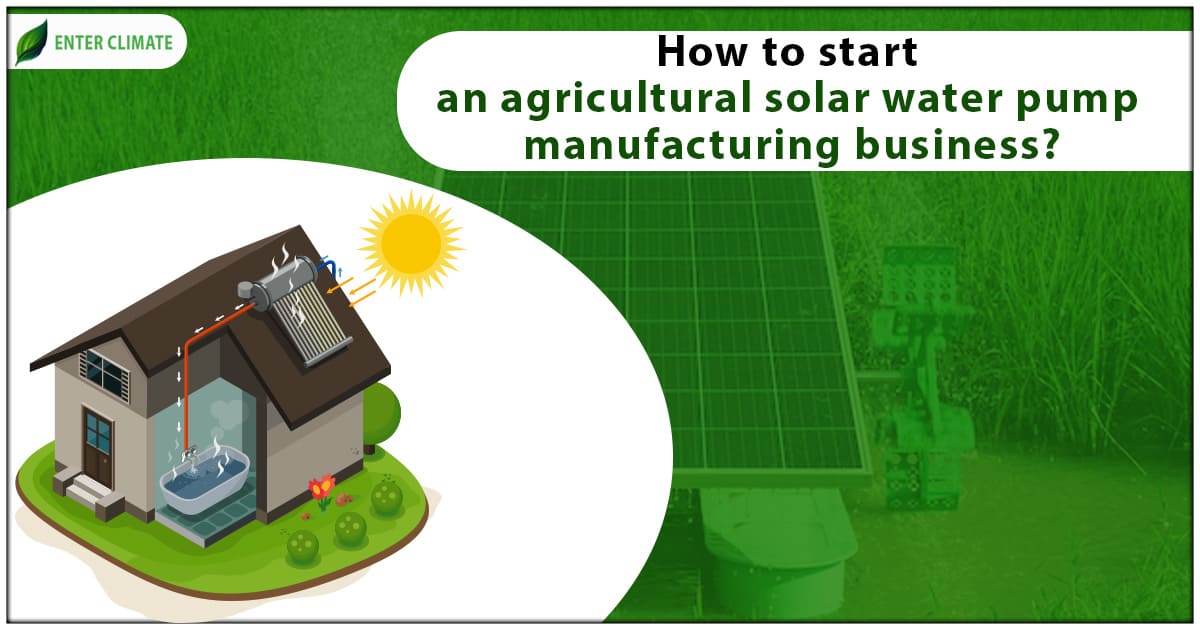How to start an agricultural solar water pump manufacturing business?
 20 Jun, 2023
20 Jun, 2023 
Agriculture has long been the foundation of numerous global economies, and India is no exception. In India, where agriculture plays a vital role in the economy, the adoption of Solar water pumps for agricultural purposes has witnessed a notable increase in recent years. To harness solar energy in remote areas where power distribution infrastructure is limited, installing off-grid solar systems, also called stand-alone systems, has emerged as the most effective approach for the solar water pump manufacturing business. In this write-up, we will delve into the concept of solar pumps for agriculture and explore the benefits of using solar water pump manufacturing business.
What is a solar agricultural water pumping system?
Solar water pumps utilize solar energy to generate electricity, powering the pumps using solar panels. The advantages of employing solar pumps for agricultural purposes are manifold.
- Solar pumps present a cost-effective and sustainable alternative to traditional pumps that rely on fossil fuels or grid electricity.
- They offer reliable access to water in remote or off-grid locations where grid electricity is inaccessible.
- Solar water pumps are available in various sizes and capacities, catering to various agricultural needs such as irrigation, livestock watering, and aquaculture.
- Specific models of Solar water pumps are designed to be submersible, enabling them to be placed directly in water sources.
- Solar-powered water pumps operate by utilizing electricity generated from solar energy. Solar photovoltaic (PV) systems are employed as complementary energy sources, working alongside diesel pumps in areas with abundant sunshine and high costs for power line installation.
- The primary application of solar pumps is for irrigation, extracting water from various sources such as ponds, rivers, bore wells, and more.
- Scalable photovoltaic systems are used for solar power generation, ranging from a few watts for smaller applications like automated farm gates or timers to hundreds of kilowatts for farm sheds and homesteads.
- Instead of relying on large centralized systems, multiple distributed PV systems can be deployed at pump sites. Solar pumping systems are particularly effective for continuous pumping operations, such as extracting water from boreholes or transferring it from dams to storage tanks.
In Solar water pumps, well-designed and modern solar systems can fulfill the required energy demands. Solar power generation systems have been globally tested and proven cost-effective and reliable, enhancing agricultural productivity.
Solar Power Systems
There are two types of solar systems utilized in the Solar water pump Manufacturing Business, one that converts solar energy to DC power and the other that converts solar energy to heat. Both types contribute to facilitating agricultural operations and enhancing productivity.
Advantages of Solar Power Systems
The Advantages of Solar Power Systems are as follows:
- The cost of solar panels is expected to decrease, making solar power economically competitive with other energy sources.
- Solar pumps are not dependent on volatile fuel prices and provide a reliable and cost-effective fuel supply.
- Over time, water pumping costs are reduced, particularly for pressurized irrigation systems where energy cost increases are offset by solar energy.
- Access to constant water supply through solar pumps enhances agricultural productivity, income diversification, and the potential for multiple energy and water uses.
Functioning of solar water pumps
The system that converts solar energy to DC power utilizes photovoltaic (PV) technology. PV refers to solar cells that convert sunlight into DC electricity.
- PV modules contain semiconductor materials, and electrons are released from the atoms when exposed to light energy.
- Electrical conductors are present on the positive and negative sides of the material, allowing the captured electrons to form a DC current.
- This electricity can be used to power various loads, including water pumps, or stored in batteries for later use.
- Since PV modules generate electricity only in sunlight, energy storage becomes essential for operating the systems during night-time.
- Energy storage can be achieved by pumping water into a tank during daylight hours and distributing it using gravity when needed after dark.
- For electrical applications, batteries are required to store the energy generated during the day.
Types of Solar Pumps for Irrigation
There are multiple types of solar-powered pumps in four primary categories: submersible pumps, surface pumps, direct current (DC) pumps, and alternating current (AC) pumps.
- Submersible pumps: These pumps are located underwater, deep below the ground level, with the intake head beyond a depth of 10 meters. They are installed through a borewell, making their installation and maintenance costs higher.
- Surface pumps: Surface pumps remain above the water surface and are installed in areas where the water table is within a depth of 10 meters. They are easy to install and maintain but not suitable for deep water tables.
- DC pump: This type of pump operates on direct current, eliminating the need for a battery or inverter.
- AC pump: AC pumps have a motor that runs on alternating currents. In this case, the direct current generated by the solar panels is converted to AC using an inverter. However, this conversion process can result in some power loss between generation and consumption.
Location to Install Solar Pumps
When selecting a location for installing solar panels and pumps in the Solar water pump Manufacturing Business, specific criteria should be followed:
- The chosen area for solar panel installation should be free from shade, dust, dirt, and excessive bird droppings.
- It should provide unrestricted tracking movement and have an even surface for mounting the panels.
- Accessibility for cleaning and proximity to the pump and water source are also important factors.
- Pumps should be installed near the solar panels within the irrigated area, and the intake lift should be below. If multiple water sources are available, the one with the highest water table should be selected for pump installation.
- The capacity of solar pumps for irrigation depends on factors such as the type of irrigation and groundwater level. Roughly, a 2 HP pump can cater to around two acres of land, while a 75 HP pump can cater to 10 acres.
- Solar pumps require minimal maintenance, primarily regular panel cleaning, to maintain efficiency. Compared to diesel pumps, Solar water pumps have a significantly longer life expectancy, continuing to produce electricity for over 25 years.
- Solar water pump offers advantages over conventional electric pumps, including not requiring fuel or electricity once installed, immunity to power cuts, low voltage, and motor burning.
- They are suitable for remote areas with no electricity or difficulty accessing diesel. They have lower maintenance costs due to fewer moving parts, reducing wear and tear.
- Solar pumping systems do not require lubricants, eliminating the risk of water or soil contamination. Moreover, they are user-friendly and easy to operate.
Government Incentives for installing Solar Water Pumps
Solar pumps can be costly despite the potential economic opportunities, with a one-horsepower pump costing approximately 1 Lakh Rupees. This upfront cost is often burdensome for small-scale rural farmers with limited land. However, the government of India has implemented schemes to promote the use of Solar water pumps. The Ministry of New and Renewable Energy (MNRE) introduced the Solar Pumping Program for Irrigation and Drinking Water, offering financial support of Rs 400 crores to install 10 lakh solar water pumping systems nationwide. State governments provide subsidies and financing options through NABARD[1], commercial banks, and other financial agencies to encourage farmers to adopt solar water pumping.
Conclusion
The manufacturing business of agricultural Solar water pumps holds significant potential and offers various advantages. The market includes both established companies and smaller players, providing options for farmers with different needs and budgets. While the upfront cost may be a challenge for small-scale farmers, government schemes and subsidies aim to make solar pumps more accessible. The advantages of solar power systems, such as reduced fuel dependency, long-term cost savings, increased agricultural productivity, and income diversification, make them a compelling choice for the agricultural sector. With the continued development and decreasing costs of solar technology, the agricultural solar water pump manufacturing business presents a promising opportunity for growth and sustainability. It is highly recommended to take expert suggestions for SOLAR WATER PUMP Manufacturing Business to comply with all the regulatory requirements and to avoid penalties due to non-compliance.
FAQ
The most common pump mechanics used are centrifugal pumps, multistage pumps, borehole pumps, and helical pumps.
The minimum number of solar panels needed to run a well pump depends on the HP of that well pump. For example, 2 solar panels of 100W each, a 1/2 HP pump, and around 20 solar panels for 5 HP will be required.
The Solar Water Pump Systems Market size was valued at USD 0.86 Billion in 2020 and is further projected to reach USD 1.94 Billion by 2028, growing at a CAGR of 10.56% from 2021 to 2028.
The manufacturing business of agricultural Solar water pumps plays a crucial role in promoting sustainable agriculture practices. Solar water pumps provide a reliable and cost-effective solution for accessing water in remote or off-grid areas where traditional electricity infrastructure is lacking. The manufacturing business of agricultural Solar water pumps creates significant economic opportunities at various levels.
In the Solar water pump Manufacturing Business, well-designed and modern solar systems can fulfill the required energy demands. Solar power generation systems have been globally tested and proven cost-effective and reliable, enhancing agricultural productivity.
Read our Article:Everything You Should Know About Solar Project Financing












